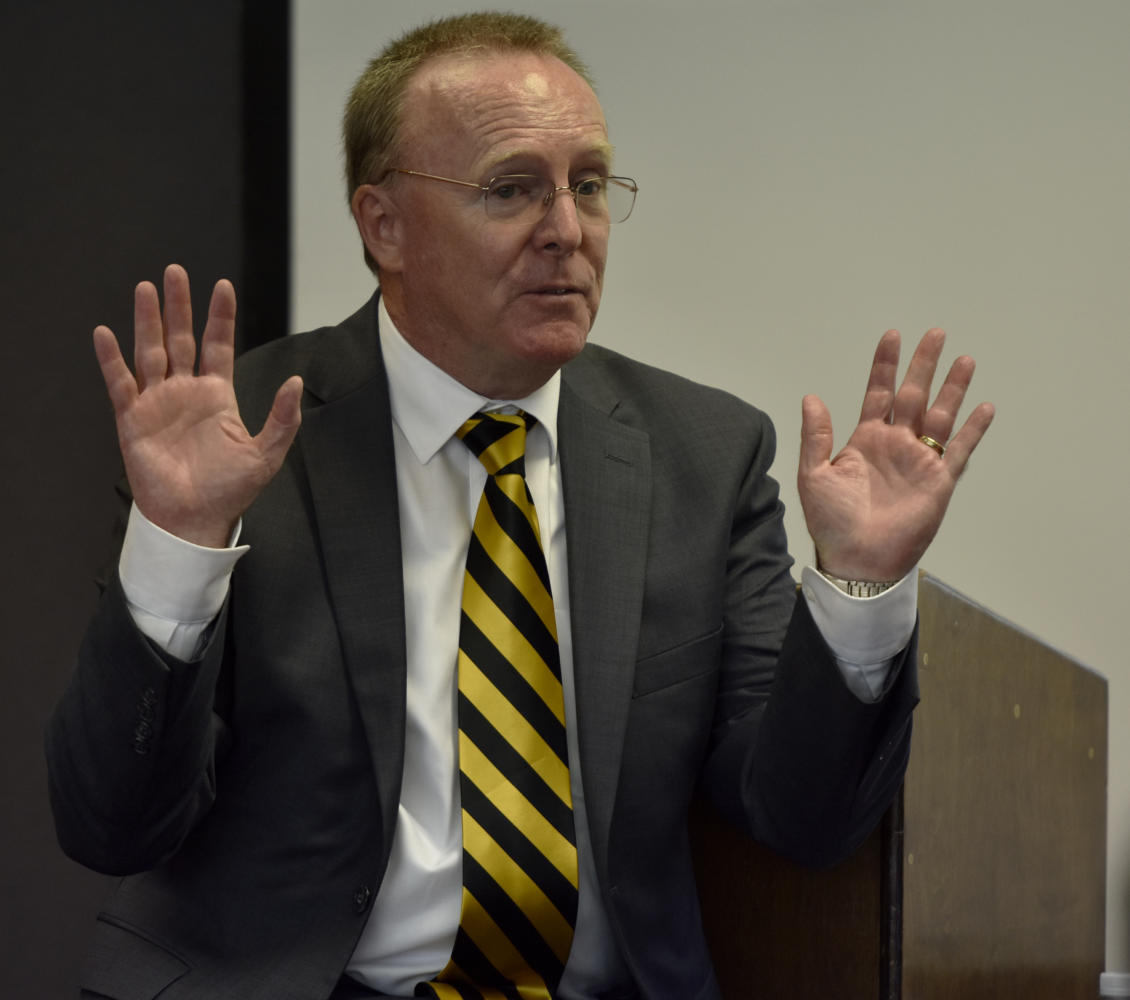James Coyle makes case for Paul Simon Institute director
Paul Simon Institute director finalist James Coyle answers questions after his presentation Thursday, Sept. 28, 2017, inside the Illinois Room at the Student Center. “I’m apolitical,” Dr. Coyle said when patriotism and support of unnamed government administrations were brought up. (Mary Newman | @MaryNewmanDE)
September 28, 2017
James Coyle, one of six finalists to become the Paul Simon Public Policy Institute’s next director, presented his plan to oversee the bipartisan think tank’s national and international expansion on Thursday afternoon in the Student Center.
If chosen, Coyle — the director of the Center for Global Education at Chapman University — would replace David Yepsen, who retired in October 2016.
His strategy for the think tank includes three categories, Coyle said: research, education and outreach. But before any changes are made, Coyle said the institute should build upon existing programs and structures that already work.
Advertisement
“My first rule of thumb is that if it isn’t broken, don’t fix it,” Coyle said. “So many people are change agents, and that can be kind of scary. I don’t believe in making change for change’s sake.”
Coyle said the institute can broaden the work it already does to become a resource for the nation, just as the institute’s founder did when he was a public servant.
“After all, Sen. Simon was not just an Illinois state government official, but he was a United States senator,” Coyle said.
He said he wants to continue the research the institute does regarding Illinois voters and issues, but he said the work could extend to national issues too, as long as shareholders are on board.
“None of these [changes] will take place unless there is buy-in by the institute’s stakeholders,” he said. “So one of the first things that I would do as director is to try to convince the stakeholders as to the rightness of my vision.”
As far as the educational prong of the plan, Coyle said he is in favor of keeping in place the institute’s student programs. He said the institute’s work with African American youth in St. Louis and the student trips it organizes to Springfield are beneficial to the region’s young people, but it can do more.
“As we move forward towards national prominence, I think we should consider expanding our efforts so that it’s not just African Americans in East St. Louis, but also maybe other disadvantaged populations, such as Latinos,” Coyle said.
Advertisement*
Coyle said in addition to the annual Youth Government Day held in Springfield, the institute could put together educational trips to Washington, D.C. or the United Nations headquarters.
The last segment of Coyle’s plan is to build upon the institute’s outreach efforts. He suggested giving the institute greater academic reach online.
He said since academics need an outlet in which to publish their work, the institute could establish an online journal for campus researchers.
“Let’s give them that outlet and we’ll all benefit by it,” Coyle said. “Of course, being online, it doesn’t cost any money.”
Coyle said he understands that these changes will require more resources and money, and he highlighted his current work at Chapman University in which he manages budgets totalling $7 million. In his time at Chapman, Coyle said he has taken the Center for Global Education from a $500,000 annual loss to a $250,000 annual gain.
The institute plays a vital role in allowing the public and policymakers to have a way to transmit their ideas to each other, Coyle said.
“The Simon Institute does two things: it explains policy to the people and then again, through its polling, it explains the views of the public to policy makers,” Coyle said.
With enrollment down nearly nine percent from 2016, Coyle said the institute should play a role in raising that number. Bolstering the reputation of the institute will, Coyle said, bolster the university’s reputation.
“You start having the ‘Paul Simon Institute at SIU’ in the newspapers, people see that,” Coyle said.
Staff writer Joe McLaughlin can be reached at jmclaughlin@dailyegyptian.com or on Twitter at @jmcl_de.
To stay up to date with all your southern Illinois news, follow the Daily Egyptian on Facebook and Twitter.
Advertisement









